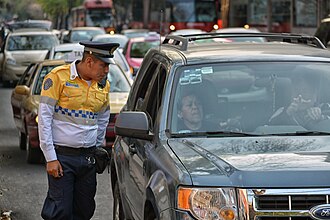
Numerous reports from Mexican news sources, El Universal and Excélsior, detail videos of police in Mexico asking for bribes.
Many people in Mexico have experienced similar situations involving police. According to a study done by Transparency International in 2019, 69 percent of people think that most police officers in Mexico are corrupt.
Mayra B, a 24-year-old dental assistant from Celaya, Guanajuato, says, “The transit police asking for money happens almost daily. They asked me for money once when they stopped me, and they tried extorting my mom in Mexico City. There are also some people who have to pay to keep their businesses running in the market.”
A secondary school teacher from the outskirts of Celaya, Estefani Tovar, 25, believes that corruption is extremely common. “In Celaya, the municipal police will let people do things like sell drugs as long as they get money in exchange.”
Mayra had similar thoughts. “If somebody has lots of money or contacts, they aren’t thrown in jail when they commit crimes.”
Corruption isn’t something that can be solely equipped with a badge in Mexico. It can also come in the form of suits and campaigns.
Mayra doesn’t trust politicians in Mexico. She says, “Politicians believe they can find a way out of any problem, and they do corrupt things because they know nothing will happen to them.”
Tovar was more specific about her thoughts on Mexico’s corrupt politicians: “Some presidents gave the country its reputation as corrupt, like Carlos Salinas de Gortari. He was one of the most corrupt politicians because during his term, he robbed so much money that should’ve been used to help better the country.”
An exceptional number of teachers in the state of Guanajuato, including Tovar, were supposedly taxed more than they should have been, which the government had said came down to an accounting error.
Tovar doesn’t have confidence that it was an accounting error at all. “I didn’t owe anything. What they did to us was a grand act of corruption. There was a change in the president and governor in Guanajuato, and now there are very corrupt people in office.”
“We shouldn’t have had to pay, so we did a protest, and we were told we would get compensation for what we were owed, but that never came,” she continued.
Tovar thinks education would be an essential tool to combat corruption. “We have so many sayings here that validate corruption, power, and money, so I think education is extremely important. We keep our mouths shut whenever we see injustices, and the situation continues to be the same. We need to raise our voices a little more after all this time.”
In recent times, Roberto Moreno Herrera, the executive secretary of Mexico’s National Anti-Corruption System, resigned following accusations of corruption, allegedly using government funds to finance personal expenses and trips.

